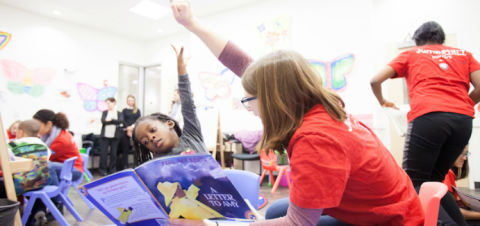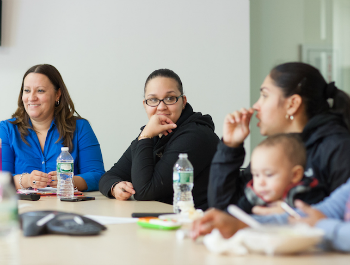Image

Frank Shea, Executive Director, Urban Edge
Challenge: Budget cuts in a Boston neighborhood forced the closing of two schools. Shortly thereafter, Boston schools’ proposed budget threatened to fall short by $50 million. What was needed was a way to fill in the funding gap to provide Boston’s neighborhoods with the resources to overcome both health and educational challenges.
Children from poor neighborhoods are more likely to live in substandard homes, and studies have linked quality, stable housing with positive health and education outcomes. Student performance varies dramatically among rich and poor neighborhoods, with wide proficiency gaps in reading and math. Meanwhile, many of the health problems and costs associated with poor housing opportunities could be prevented or reversed through education that can modify behaviors and lifestyles. Those changes are simple, novel, evidence-based approaches, which include exercise, proper nutrition and anti-stress activities.
Unfortunately, schools in poor neighborhoods lack the financial resources needed to provide even these simple remedies to improve the performance and health of their students. In Boston’s Hyde Park neighborhood, budget cuts forced the closing of two schools in 2015; the following year Boston schools’ proposed budget threatened to fall short by $50 million. Addressing the gap opened by shrinking school funding is thus critical to improving the health and academic performance in Boston’s neighborhoods.
For over 40 years, Urban Edge has been building and preserving quality affordable homes and promoting housing stability through programs such as eviction prevention and economic resiliency programs. Roughly 3,000 people live in Urban Edge’s housing, and 85 percent of those households have school-age children. Over the years, we have seen fewer evictions and other signs of increased housing stability in the 1,400 units we own in Boston. However, rising costs for student services in our communities cannot keep up with current revenue sources.
To fill the this critical gap for students in need, Urban Edge joined forces with several partners to improve health and education opportunities in the Egleston and Jackson Square neighborhoods. Our 2015-2020 strategic plan provides an integrated approach to community development with holistic programs that supplement our housing work with new initiatives in early education, financial resiliency, youth engagement and public health and wellness.
Urban Edge teamed up with Union Capital Boston (UCB), Families First Parenting Programs, Jumpstart and local health organizations to create a pre-K readiness program that incorporates comprehensive wellness benefits through healthy habits. The goal of the program is to increase children’s developmental gains, as well as provide caregivers with the knowledge and skills necessary to prepare children for kindergarten. This pre-K readiness program assists the entire family. It provides an opportunity for parents to help improve their children’s literacy, expose them to school settings, increase parenting skills and knowledge about child development. It also builds stronger families and their connection to the community.
 The Families First Parenting programs provide parents with the tools they need to become effective advocates for their children’s education. Research shows that when parents take an active role in a child’s development, they can promote their mental, emotional and physical health, thus breaking the cycle of poverty for their families.
The Families First Parenting programs provide parents with the tools they need to become effective advocates for their children’s education. Research shows that when parents take an active role in a child’s development, they can promote their mental, emotional and physical health, thus breaking the cycle of poverty for their families. The program, which is specifically designed for young parents and their children, offers exercise classes and education on healthy diets. Nutritional instruction, grocery shopping tips and zumba classes are just some of the resources offered. Fitness, nutrition, and social support services are the pillars of the program, which promotes healthy life skills and helps put parents on the path to self-sufficiency.
One woman said the program made a tremendous difference in her child’s progress.
“My daughter was diagnosed with autism at age 2. She had no language. Since this September when school started [she] started saying words. We are so excited for her!”
UCB offers a financial perk for joining the program. Its mobile-based loyalty program for low-income families gives social and financial service rewards in exchange for community involvement in schools, health centers and civic programs. Every time a parent attends a pre-K readiness class, they check in via the UCB app. Residents accumulate points for each check-in, which can be redeemed for gift cards and other prizes at the end of the program.
This innovative, multi-faceted, dual-generation approach holds great promise for enhancing the academic and life opportunities for the families we serve. The participating parents have emerged as leaders in the community, recruiting other participants and planning and implementing future programming in paid, part-time positions.
We are in the early stages of this plan, but we’ve gained many insights in the process. First, lack of funding to further our goals doesn’t need to be a deal-breaker. Innovative approaches and partnerships can fill those gaps. And sometimes the most effective remedies to a problem are the simplest, like promoting positive change by providing basic information on wellness and parenting skills. Finally, those you seek to serve in your endeavors can turn out to be the best promoters -- like our program’s participating parents who have taken the reins into their own hands.

